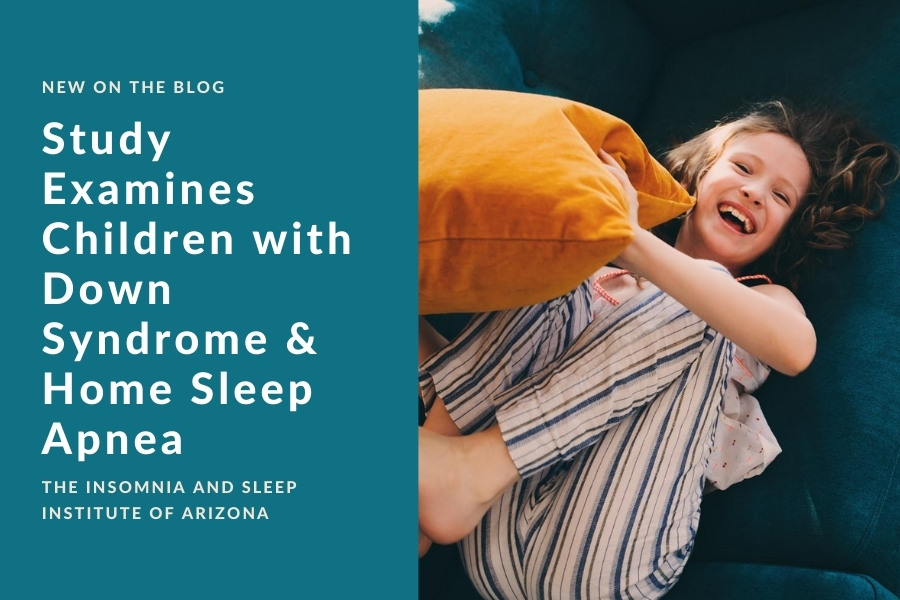Obstructive sleep apnea (OSA), the most common type of sleep apnea, is relatively common in children but exponentially so for those with Down syndrome. In fact, between 40 – 50 percent of kids with Down syndrome have OSA while just 3 – 5 percent of those without Down syndrome struggle with this sleep disorder. The Insomnia and Sleep Institute of Arizona proudly serves as the Face of Sleep Medicine in Arizona and treats pediatric patients as young as two years old. We are home to the “Top Doc” in the region for the past six consecutive years, an honor voted on by fellow sleep experts. We are an outcome-driven facility, which means a correct diagnosis always comes first.
OSA is most prevalent during the rapid eye movement (REM) stage of sleep when the body is totally relaxed, which is why the upper airways can get blocked during this important sleep time. Those with Down syndrome also tend to have a larger tongue, midfacial hypoplasia, and comparably low muscle tone—which is why they face a higher risk of OSA. OSA and the consistent obstructed breathing it causes leads to retaining carbon dioxide, oxygen deprivation, and routinely waking throughout the night so that the child does not get the sleep they need.
The Reality of OSA Issues
While OSA affects people of all ages, in children it is especially known for exacerbating or causing neurocognitive and behavioral issues. Although obesity is a factor in OSA, even those who are a healthy weight can suffer from negative cardio-metabolic issues such as high blood sugar, hypertension, and inflammation when they have OSA. Unfortunately, research is still lacking when it comes to sleep disorders and children with Down syndrome, but recent research supported by the Eunice Kennedy Shriver National Institute of Child Health and Development and the INCLUDE Project has put a spotlight on this intersection.
Currently, the American Academy of Sleep Medicine is not a proponent of at-home sleep apnea testing for kids. This is why the vast majority of sleep centers exclusively offer clinical testing. However, some researchers are supporting initiatives in favor of in-home testing for key populations, such as kids with Down syndrome. The thought is that this approach will allow for quicker diagnosis and treatment of OSA given the difficulties that are inherent with lab testing for this demographic (and many others).
The Current State of Sleep Testing
Right now, the common route for diagnostic testing for OSA requires overnight stays where the patient is connected to multiple leads, sensors, and straps. This is required to monitor movement. Additionally, a pulse oximeter and nasal probe are used. According to lead researchers, “It’s a lot, especially for a child with sensory issues that may be complicated when sleeping away from their usual environment.” It’s no surprise that many parents avoid placing their child in an in-lab testing environment, but this decision can of course result in delayed diagnoses and lack of treatment.
The study’s researchers collaborated with a behavioral psychologist with a focus on patients who have developmental disabilities. In the near future, the team plans to secure 35 young people with Down syndrome (ages 10 – 20) for both an in-lab sleep test and an at-home study. The goal is to determine if testing at home is possible and of high quality when compared to the in-lab counterpart.
Treating OSA in Those with Down Syndrome
Most children with OSA undergo adenotonsillectomy, but this might not be the best strategy for those with Down syndrome. Instead, adopting CPAP therapy in lieu of surgery (which is the gold standard for adults with OSA) might be more appropriate. All families included in the study will be interviewed, including those who currently use CPAP therapy. The goal of the interviews is to find out what works, what doesn’t, and what support networks would have been helpful. According to the researchers, the most important factor of the interview is to identify what families think are critical efforts for future studies.
If you or your child has trouble with sleep disorders, including OSA, working with the leading sleep specialists is the best way to get the support you deserve. Connect with The Insomnia and Sleep Institute today by calling the office or, for the fastest response, complete the online form now.





